- Home
- Jeff Mariotte
City Under the Sand Page 2
City Under the Sand Read online
Page 2
“I’d hate to meet anything that’s lived under this sand for centuries,” Curran said.
“I don’t think there’s anything here,” Maron said. “I haven’t heard a sound, nor seen the slightest movement.”
“That’s what I don’t trust,” Curran said.
“Stand behind me if need be,” Hagkun offered. “Let’s go.”
They picked the nearest street and started down it. The buildings were close together, some leaning forward so far that they almost formed an archway overhead. Most were at least partially destroyed; rubble leaked into the roadway from open doorways. Oddly, many of the upper windows were sealed off with wood or masonry. Here and there a building had completely disintegrated, only floors or marks on the structures flanking them showing that anything had once stood. The soldiers looked into some they were all the same: empty, long since abandoned.
In the fifth one, they found bones.
“Human, do you think?” Curran asked.
Avra shouldered past the others and picked a skull from a pile of browned bones. It was rounded, with a slight forward thrust at the jaw and sharp canine teeth. “Looks human. More or less.” With his left hand, he shook it at the others and spoke in a deep, threatening voice. “You’ve come for my treasure, haven’t you? Dogs! I’ll have your filthy hides!”
“Put it down, Avra,” Shen’ti said. “Don’t dishonor the dead.”
“These dead have been buried so long, they’re probably glad for a little attention,” Avra replied. He put the skull back anyway—truth was handling the thing had been a little disturbing. He didn’t know for sure how old these ruins were or what fate had befallen the city’s residents, but judging from this bone-filled room, at least a dozen of them had met their end right here.
When he left the building behind and felt the warmth of Athas’s afternoon sun on his shoulders once more, he couldn’t hold back a shiver of relief.
After that, they started finding skeletons on a regular basis. Not just human ones, but those of other beasts as well. Some looked familiar, as if they had belonged to beetles or bears or kanks or various sorts of lizards, but none exactly resembled their modern counterparts.
He was starting to agree with Burek and Curran—that they ought not to be there, and would do well to be far away by the time the two moons rose.
And that was before they met the sand howlers.
4
They were crossing a narrow side street when the shadows down the block seemed to ripple. “What’s that?” Shen’ti asked.
“A cloud across the sun?” Maron offered.
“There’s no sun down there,” Shen’ti said pointedly. He paused and drew his bone dagger from the sheath on his belt. “Something’s moving.”
He barely got the words out before the pack separated from the shadows and streaked across the cluttered roadway toward them. There were a dozen of them, the size of large dogs, their big oval heads crowded with eyes. Their fur was dark brown and black, and yellow tusks jutted up from slavering lower jaws. One of the creatures loosed a howl as they came.
“Sand howlers!” Hagkun shouted. “Don’t look into their eyes, and fill your hands!”
Avra hadn’t let go of his sword since the battle against the raiders. It might as well have grown into his right fist, which at this moment he wouldn’t have minded. The soldiers took a step back, but then heard growls and running footfalls from the side street’s other direction. The only paths open were straight ahead or back the way they had come—but there was no time for retreat, and little space with the six of them crowded into a cramped, rubble-strewn roadway.
The first howler met its end on the twin crescent blades of Hagkun’s lotulis; the animal leapt, Hagkun dropped to a crouch and thrust the weapon at the thing’s underside. Its own momentum forced it down onto the blades, its oversized head snapping and gnashing until it finally died. Avra swung his sword with a mighty grunt as one of the howlers charged him, and the blade crushed the beast’s skull, dropping the beast at his feet. The animals had a sharp, musky scent that wasn’t altogether unpleasant.
Behind him, a pair tore past Burek’s defenses. Avra heard a piercing scream and the snarl of a canine with flesh in its grasp. He spun around to find Curran in his way, armed only with a dagger. Curran thrust it forward but a howler snapped with its huge maw, and one of those tusks jutted through Curran’s arm. Curran went white and let out a howl of his own.
The scene became a confused blur of fur and fangs, blood and blades. Three more howlers fell quickly, but not before tearing out Maron’s throat. The others bunched up and retreated—Curran taking shaky steps, blood gushing from his ravaged arm—holding off the advancing sand howlers. Shen’ti had snatched up Burek’s trikal—a tusk grazing his arm as he reached for it—and its long shaft gave him greater advantage than his dagger had.
The creatures nipped at them, herding them back down the road but keeping a safe distance. Avra started to believe they might escape with their lives, although he doubted Curran’s would last much longer, not if he couldn’t staunch the flow of blood from that arm.
But then Hagkun forgot his own warning and locked eyes with one of the howlers. Its eight eyes bored into his two, paralyzing him. “Hagkun!” Avra shouted, shaking the mul. “Keep moving!”
No use. Hagkun was a fleshy statue, yielding but immobile. Had they been able to carry him, they might have saved him yet. But they needed their hands free for weapons.
“Hagkun!” Avra screamed once more, right into the mul’s ear. Hagkun, already lost, didn’t answer.
Avra had barely taken a step back when two of the howlers lunged for his throat.
One of them sank its teeth into Hagkun’s flesh, breaking the paralysis but too late for Hagkun to fight back, time only for the mul to writhe in agony as the beasts took him down. Avra struck at one, carving a deep gash in the top of its head, and then Shen’ti was pulling on him. “Now, Avra, while they’re engaged!” he shouted.
Avra hated to leave his friend, but couldn’t deny the sense in Shen’ti’s desperate words. The big mul partially blocked the roadway, and the howlers feasting on him filled the space even more. Other howlers paced behind them, wanting either to get at the remaining humans or take a turn at the mul. Behind them, more were still tearing off bits of Maron and Burek.
The three remaining soldiers had a moment’s grace period, in which they might yet escape. Only a fool wouldn’t take it, and Avra was no fool. He grabbed Hagkun’s lotulis, gripping it in his left hand and the agafari sword in his right, and ran.
Shen’ti led the way. Instead of going back to the wide avenue, and the desert beyond, between ragged breaths he huffed out his belief that the howlers would surely catch them on open ground, and their best bet was to hole up somewhere in the city until they were gone. Avra didn’t argue—he didn’t know which course of action made the most sense, only knew that getting out of the howlers’ sight seemed like an excellent idea.
They had to help Curran from time to time, but a few minutes later they had taken refuge on the third floor of what must once have been a luxurious home. The rooms were big, with vaulting ceilings and fine tiles on the floor. Arched windows looked out over the buildings directly opposite toward the desert. The sun had continued to descend, and shadows stretched far across the sandy wasteland.
Shen’ti gazed out one of the windows. “Even if they follow,” he said, “they can’t jump this high. And if they try to come up the stairs we can pick them off one or two at a time.”
“But how long can we take refuge here?” Avra asked. “You have a little water, but not enough to last long. We’ll need to eat. Unless you propose we hunt down one of those howlers for food. I think I’d as soon eat my own foot.” He glanced at Curran, face drawn and pale, cradling his ruined arm, and regretted his words.
“One night won’t kill us,” Shen’ti said from the window. The setting sun limned his lean face, lighting the eye facing into it with red fire. “Surely the howlers will
have lost interest by morning.”
“And as long as nothing else catches our scent, we’ll be safe? Is that your plan?”
“What else is there? This city’s deserted.”
“We thought that before we met the sand howlers, too.”
“They probably came in after the dune shifted off it, same as us. Saw there was nothing in here worth eating, until they sniffed us out.”
Avra thrust an arm toward him. “Give me some of that water, then.”
Shen’ti shrugged off the bladder and handed it over. It wasn’t as heavy as Avra had hoped. “Go easy,” Shen’ti said.
Avra took a swig, swishing the stale water around in his mouth a few times before swallowing, as if he might fool himself that he’d had more than he did. Then he carried the bladder to Curran. “Water, Curran. Open up.”
Curran looked at him with deep, haunted eyes. “N-no,” he said. “Don’t w-waste any on m-me.”
“It’s no waste. We just need to get through tonight, and—”
“And then c-cross the desert on foot … searching for N-n-nibenay? I won’t m-make it, man. Th-this is where I d-die.”
“No more dying,” Avra said. “Shen’ti, tell him.”
But Shen’ti simply looked out the window, watching for howlers.
5
Curran was dead by morning.
The moons had been bright that night. When it was Avra’s turn to stand watch, he looked out over the once-buried city, dual shadows shifting as the moons cut their paths across the sky. He tried to picture the streets clogged with activity, the aromas of cooking fires and exotic perfumes wafting on a breeze, but he couldn’t. The place was dead, and might always have been so if not for the skeletons they had found.
When he slept, his dreams were dark and disturbed, full of faceless, nameless terrors. He could not remember details when he woke up, only the overwhelming sense of dread that had engulfed him, and that stayed with him into the day.
When sunlight struck his face in the morning, his eyes snapped open and he came to instant wakefulness. He looked over at Shen’ti, snoring softly where he leaned against the window, and then at Curran, arms out to his side, a pool of thick, dried blood around him.
“Shen’ti,” Avra said quietly.
Shen’ti jerked his head up, snorted, and blinked at him. “Akrankhot,” he mumbled.
“What?” Even as he asked, Avra realized he knew the word too, as if it had entered his mind through those confused dreams.
“It’s the name of this city. Akrankhot.”
“It’s a damnable place, whatever it’s called,” Avra said. “I think you’re right, though. That name is in my head, too.” He shook his head as if to loosen something stuck there. “I don’t know why, but it is.”
“Do you recall ever hearing anything about it?”
“Not a thing. As far as I know it hasn’t been thought of once since the desert swallowed it.” Avra tilted his head toward Curran. “He’s dead.”
“I see that. Never believed he would make it through the night.” Shen’ti’s words struck Avra as harsh, even though Avra had shared the sentiment.
“You think we can get out of here now? I don’t believe there’s any treasure to be had—certainly nothing worth the cost of our lives, in addition to the four already lost.”
Shen’ti gazed out the window for a long moment. “I think per—”
Avra shushed him. He pointed toward the open doorway. “Someone’s on the stairs.”
“Howlers?” Shen’ti asked.
“I don’t know.” He had heard the scuff of a foot. Just the one, but unmistakable. In a city so quiet, every sound stood out. As the two soldiers listened, they heard another one.
“The window,” Shen’ti said.
“We’re three floors up.”
Shen’ti was already stepping over the windowsill. “What if it’s a pack of howlers? Or something worse?”
Avra didn’t have to think it over. Whatever was out there might be sniffing them out, but without knowing for certain who was up here, or how many. When it, or they, found Curran, that might be distraction enough. Anyone looking at the window would have the same first reaction Avra had—only a fool would jump down three stories.
And it was true. But he and Shen’ti had never claimed not to be fools, in Avra’s memory.
Shen’ti lowered himself until he was dangling from his fingertips, then dropped to the street below. He hit with a thump, falling backward onto some rubble, and let out a tight cry. Avra followed suit. When he landed, his left ankle twisted beneath him and he flopped forward against the rough stone wall of the building. Dropping this way meant leaving Hagkun’s lotulis behind, but he still had his own sword.
“You hurt?” Shen’ti asked.
“I’ll live,” Avra said. “Let’s get out of here!” He started running, favoring his hurt ankle. When he glanced back to make sure Shen’ti followed, he saw a shadow in the window they had just left. One of the sand howlers, its eyes glittering in the sunlight.
Several blocks later, they still had not reached the wide avenue that marked the city’s boundary. The pain in Avra’s ankle had reached an agonizing level, and it was already beginning to swell. “I can’t run anymore,” he said, leaning on a nearby wall for support. “Are they chasing us?”
“I don’t know,” Shen’ti said.
“I can’t run anymore,” Avra said. “I’m sorry, Shen’ti. Perhaps you should escape. I need to let my ankle rest.”
“Neither of us will make it alone,” Shen’ti said. “If rest we must, let’s find another hiding place. A better one, this time, where they can’t sniff us out.”
Avra knew he couldn’t run more than a few steps without collapsing. If he went slow, kept his weight off his left leg, he could get around, but barely. Healing might take days.
He kept his mouth shut, though. He had offered Shen’ti a way out. If the man chose not to take it, Avra couldn’t force him.
“Through here!” Shen’ti shouted. He pushed on a wooden door, held closed only by the sheer weight of debris piled on the floor behind it. The stuff scraped back as Shen’ti forced the door open. Avra searched for any indication of what the building’s function had once been, but the walls were empty. Akrankhot, he remembered. At least we know that much about it.
Shen’ti shoved the door closed. They waded through detritus, mostly plaster from the walls and collapsed ceiling, and through an arched doorway on the far side of the room.
Here they found another staircase, spiraling up and down. Not much light filtered through the closed door, although there might have been windows on an upper floor. Shen’ti started up.
“No more jumping!” Avra insisted. “Let’s go down.”
“But.… we’ll be trapped down there, if anything follows us in.”
“I’ll be just as trapped above,” Avra said. “I can’t risk landing on this ankle again, so either way I’ll have to fight.”
Shen’ti shrugged. “Down it is, then.” He started to descend, and Avra followed, pressing against the walls to help.
He had not known Shen’ti well, but the man had always struck him as opinionated, never shy about sharing his beliefs. If Shen’ti thought they should go up, he would have made that argument. Avra was glad not to be deserted, but there was something strange about how agreeable the man had become. Shen’ti would bear close watching.
The stairs wound down and down, into what seemed like the depths of Athas itself. They should have been pitch black after the first curves, but somehow the walls seemed to glow with just enough luminosity to keep the short, smooth stone steps visible. Avra kept expecting a landing, a subterranean floor—some sort of destination for this staircase. But instead of finding it, he kept limping, around and around. Shen’ti was moving faster, so far ahead that Avra could no longer hear the huff of his companion’s breath, only the rasp of his feet on the steps. The air was blessedly cool, but held a sharp tang reminiscent of blood, giving him the
unpleasant sensation that he was descending into some gigantic creature’s veins.
Finally, after what seemed like the duration of a festival week, Shen’ti uttered a short, sharp cry. “Ha!”
“What?” Avra asked, trying to hurry down without pitching forward onto his face.
“Avra, it’s … come quick!”
“I’m coming!”
He went as fast as he dared, and the bottom seemed to arrive suddenly, bringing him up short and almost causing him to stumble. Even down here, leagues underground, that glow persisted, illuminating a massive subterranean cavern.
“Look, Avra!” Shen’ti said. His voice was hushed, and he waved a hand toward the contents of the cavern.
Everywhere, piled up on the floor, stacked on tall racks, even thrust into the walls themselves, was metal. Rods of metal as big around as Avra’s wrist, balls the size of a man’s skull, rectangular bars, and more, all of it gleaming in the soft light.
Avra rushed forward and picked up a bar. It seemed to weigh as much as a large child. “It’s really steel,” he said, his voice quaking with wonder. “I’ve never even dreamed of this much in one place.”
“Do you know what kind it is?” Shen’ti asked him.
“No. I’ve held iron and once, gold. But this? I’ve no idea. It’s a treasure trove, though.”
“Not as easily transported as gold or gems.”
“No. But this much of it—do you have any idea what the Shadow King would give for this? Or any other sorcerer-king, for that matter?” The cavern reached back into the darkness, beyond where Avra could see, although he believed if he walked that way the illuminated walls would continue to light his path. “An army could be outfitted with this, or an entire currency minted. Possibly both!”
Shen’ti stroked his chin. “You might be right, Avra.”
“Perhaps we can salvage something from this damned trip after all,” Avra said. “Certainly House Faylon won’t be paying us for our trouble.”
“But how … we’d need an argosy to carry all this. A dozen of them.”

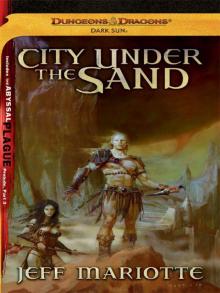 City Under the Sand
City Under the Sand The Burning Season
The Burning Season Sanctuary
Sanctuary Winds of the Wild Sea
Winds of the Wild Sea Serpents in the Garden
Serpents in the Garden Close to the Ground
Close to the Ground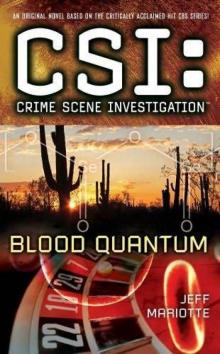 Blood Quantum
Blood Quantum Brass in Pocket
Brass in Pocket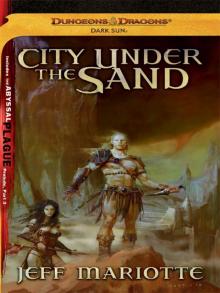 City Under the Sand: A Dark Sun Novel (Dungeons & Dragons: Dark Sun)
City Under the Sand: A Dark Sun Novel (Dungeons & Dragons: Dark Sun)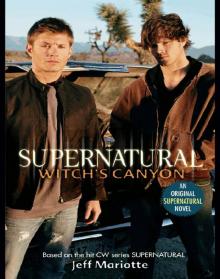 Witch's Canyon
Witch's Canyon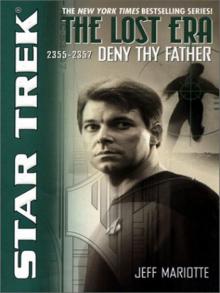 STAR TREK: The Lost Era - 2355-2357 - Deny Thy Father
STAR TREK: The Lost Era - 2355-2357 - Deny Thy Father Dawn of the Ice Bear
Dawn of the Ice Bear The Xander Years, Vol.2
The Xander Years, Vol.2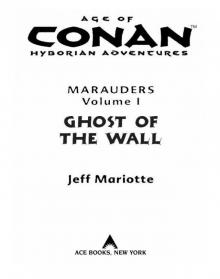 Ghost of the Wall
Ghost of the Wall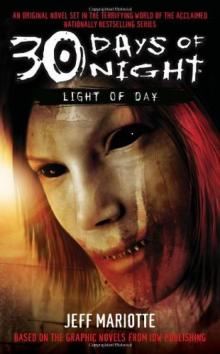 30 Days of Night: Light of Day
30 Days of Night: Light of Day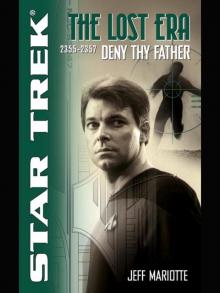 Deny Thy Father
Deny Thy Father Criminal Minds
Criminal Minds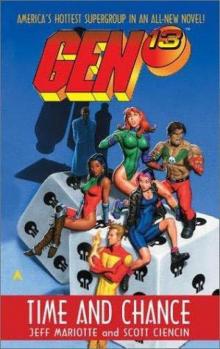 Time and Chance
Time and Chance The Folded World
The Folded World Bolthole
Bolthole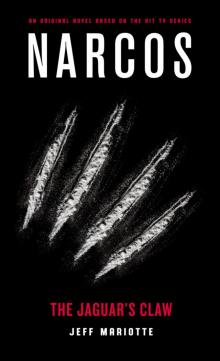 Narcos
Narcos Right to Die
Right to Die